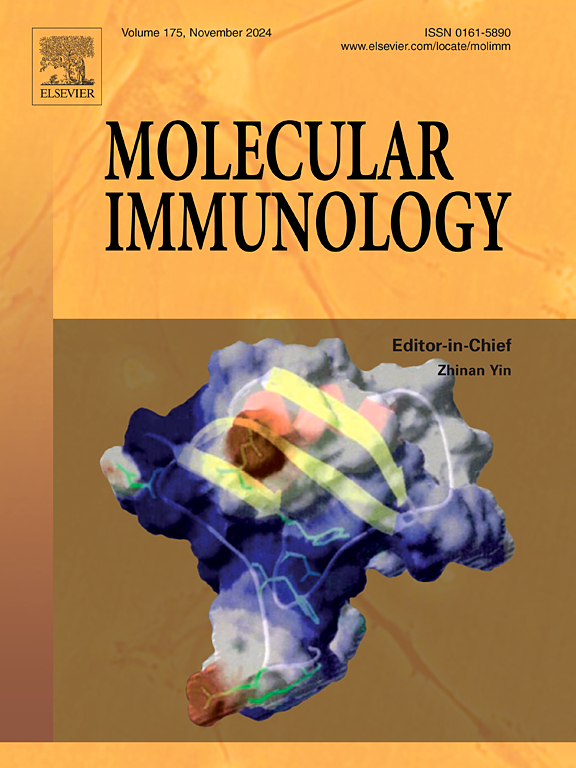GDF15激活PI3K/AKT通路,介导巨噬细胞M2极化,促进前列腺癌对多西紫杉醇耐药
IF 3
3区 医学
Q2 BIOCHEMISTRY & MOLECULAR BIOLOGY
引用次数: 0
摘要
耐药是癌症治疗的主要挑战,巨噬细胞极化在前列腺癌(PCa)的发展中起着关键作用。生长分化因子15 (GDF15)在大多数癌症中高表达,并在抗癌治疗过程中被诱导。本研究旨在探讨GDF15在PCa患者巨噬细胞极化和多西紫杉醇耐药(DTX)中的调控机制。我们收集PCa患者的临床样本,评估GDF15的表达水平及其与m2型巨噬细胞极化的相关性。本研究采用CCK-8、RTqPCR、流式细胞术、western blotting等方法研究GDF15调控巨噬细胞M2极化和PCa化疗耐药的机制。结果显示,GDF15在PCa样品中显著上调,且与M2巨噬细胞极化水平密切相关。进一步实验发现M2巨噬细胞可合成GDF15,参与调控PCa细胞对DTX的耐药。在m2型巨噬细胞中敲除GDF15表达后,我们观察到PCa细胞对DTX的抗性明显减弱。这种调节机制主要通过抑制PI3K/AKT信号通路,阻止巨噬细胞M2极化来实现。综上所述,M2巨噬细胞中GDF15的上调可激活PI3K/AKT信号通路,增强PCa细胞对DTX的抗性。这些发现为前列腺癌化疗耐药的治疗策略提供了新的见解和潜在靶点。本文章由计算机程序翻译,如有差异,请以英文原文为准。
GDF15 activates the PI3K/AKT pathway to mediate macrophage M2 polarization to promote prostate cancer resistance to docetaxel
Drug resistance in cancer treatment is a major challenge, and macrophage polarization plays a key role in the development of prostate cancer (PCa). Growth differentiation factor 15 (GDF15) is highly expressed in most cancers and is induced during anticancer treatment. The aim of this study was to investigate the regulatory mechanism of GDF15 in macrophage polarization and resistance to docetaxel (DTX) in PCa patients. We collected clinical samples from PCa patients to evaluate the expression level of GDF15 and its correlation with M2-type macrophage polarization. In this study, CCK-8, RT![]() qPCR, flow cytometry and western blotting were used to investigate the mechanisms by which GDF15 regulates macrophage M2 polarization and PCa chemotherapy resistance. The results showed that GDF15 was significantly upregulated in PCa samples and was closely related to the level of M2 macrophage polarization. Further experiments revealed that M2 macrophages synthesize GDF15, which is involved in the regulation of DTX resistance in PCa cells. Following knockdown of GDF15 expression in M2-type macrophages, we observed that the resistance of PCa cells to DTX was significantly attenuated. This regulatory mechanism was achieved mainly through the inhibition of the PI3K/AKT signaling pathway, preventing the M2 polarization of macrophages. In conclusion, the upregulation of GDF15 in M2 macrophages can activate the PI3K/AKT signaling pathway, enhancing the DTX resistance of PCa cells. These findings provide new insights and potential targets for treatment strategies against PCa chemotherapy resistance.
qPCR, flow cytometry and western blotting were used to investigate the mechanisms by which GDF15 regulates macrophage M2 polarization and PCa chemotherapy resistance. The results showed that GDF15 was significantly upregulated in PCa samples and was closely related to the level of M2 macrophage polarization. Further experiments revealed that M2 macrophages synthesize GDF15, which is involved in the regulation of DTX resistance in PCa cells. Following knockdown of GDF15 expression in M2-type macrophages, we observed that the resistance of PCa cells to DTX was significantly attenuated. This regulatory mechanism was achieved mainly through the inhibition of the PI3K/AKT signaling pathway, preventing the M2 polarization of macrophages. In conclusion, the upregulation of GDF15 in M2 macrophages can activate the PI3K/AKT signaling pathway, enhancing the DTX resistance of PCa cells. These findings provide new insights and potential targets for treatment strategies against PCa chemotherapy resistance.
求助全文
通过发布文献求助,成功后即可免费获取论文全文。
去求助
来源期刊

Molecular immunology
医学-免疫学
CiteScore
6.90
自引率
2.80%
发文量
324
审稿时长
50 days
期刊介绍:
Molecular Immunology publishes original articles, reviews and commentaries on all areas of immunology, with a particular focus on description of cellular, biochemical or genetic mechanisms underlying immunological phenomena. Studies on all model organisms, from invertebrates to humans, are suitable. Examples include, but are not restricted to:
Infection, autoimmunity, transplantation, immunodeficiencies, inflammation and tumor immunology
Mechanisms of induction, regulation and termination of innate and adaptive immunity
Intercellular communication, cooperation and regulation
Intracellular mechanisms of immunity (endocytosis, protein trafficking, pathogen recognition, antigen presentation, etc)
Mechanisms of action of the cells and molecules of the immune system
Structural analysis
Development of the immune system
Comparative immunology and evolution of the immune system
"Omics" studies and bioinformatics
Vaccines, biotechnology and therapeutic manipulation of the immune system (therapeutic antibodies, cytokines, cellular therapies, etc)
Technical developments.
 求助内容:
求助内容: 应助结果提醒方式:
应助结果提醒方式:


